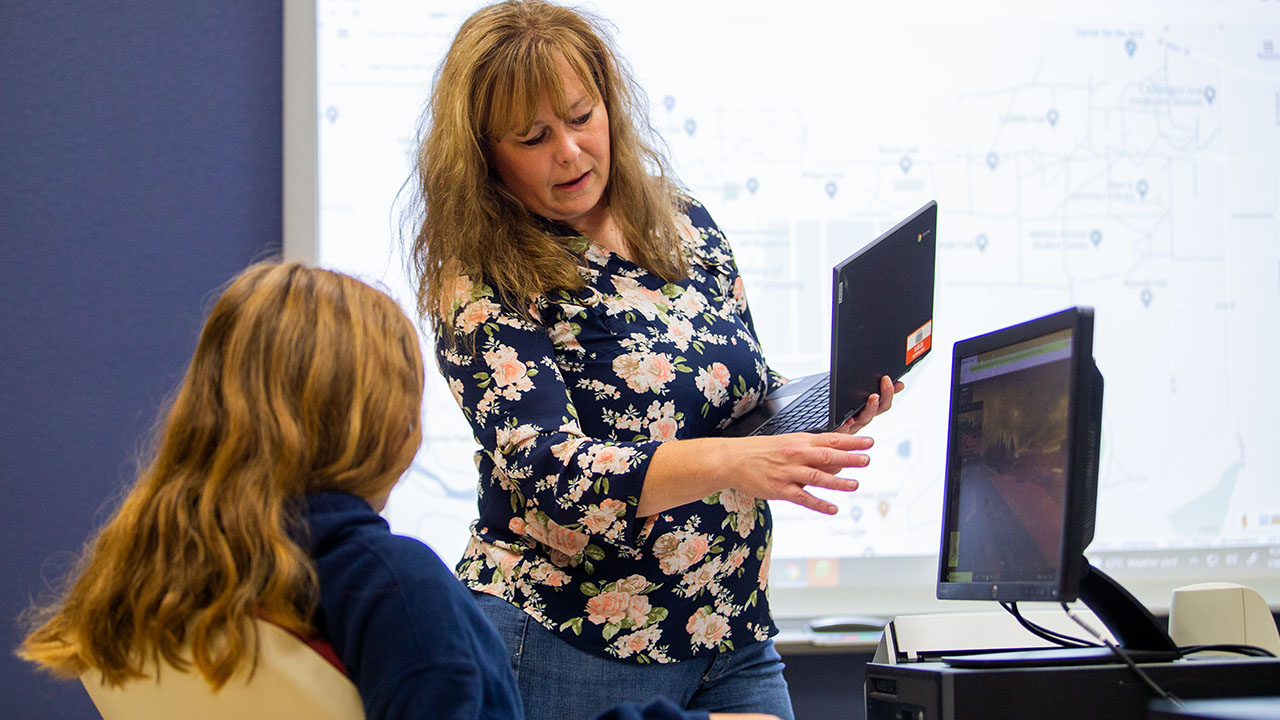
Jessica Brogley works with a student.
Building on its strong legacy of being the first teacher preparation institute in the state, the University of Wisconsin-Platteville’s School of Education has a long history of looking toward the future and anticipating and responding to the needs of the communities and schools it serves — and in recent years, those needs are increasingly revolving around technology. That is why UW-Platteville education students are leading the way in pursuing voluntary Google for Education certification, long before they even graduate.
Jessica Brogley, a senior lecturer in the School of Education, teaches educational technology courses at UW-Platteville, where students learn the fundamentals of Google Workspace tools, in addition to tools that support digital storytelling, content delivery, augmented and virtual reality and more. It’s not a course requirement for the students to pursue Google certification, which is why Brogley said she is impressed to see the increasing number of students voluntarily taking it on — in fact, more than 50 students since the spring semester achieved level 1 or 2 certification.
“It’s impressive to see just how many students are willing and able to become certified on their own time,” said Brogley.
Brogley knows better than most how important these skills are for teachers to bring to the classroom. She is one of the few educators in Southwest Wisconsin who is a Google for Education Certified Trainer and Certified Innovator, as well as a Google Streetview verified photographer. She founded the Southwest Wisconsin Google Educator Group and is one of the leaders of Global Google Educator Group, a leadership team from around the world, all committed to improving education with technology.
“It’s important that we are turning out graduates who are well-trained in leveraging technology in the classroom,” said Brogley. “For our students to earn their Google Certifications before their first job speaks to their technology skills and commitment to the profession.”
This is particularly important, Brogley said, when preparing students to teach in rural communities, which is a focus of the School of Education’s place-based learning curriculum.
“For our students pursuing careers in rural areas, it’s essential that they arrive with a wide-array of technology skills as they might not have instructional technology support or easily be able to attend conferences,” said Brogley. “Arriving well-prepared puts our students on a trajectory that impacts student achievement for years to come.”
Jacqueline LeFevre, a senior from Rockton, Illinois, double majoring in biology and broad field science with an emphasis in secondary education, earned her certification last spring and said she has already received positive feedback from potential employers.
“I knew my future in education would involve implementing digital resources and most certainly Google Workspace applications in the classroom,” said LeFevre. “I wanted to familiarize myself with what Google tools had to offer beyond what I already knew, so I can share these insights with both my students and my future district. During my first interview for an educator position, interviewers – the principal, vice principal and multiple teachers – commended me on my Level 1 and 2 certification listed on my resume and were excited to hear how I would use this knowledge in the classroom.”
